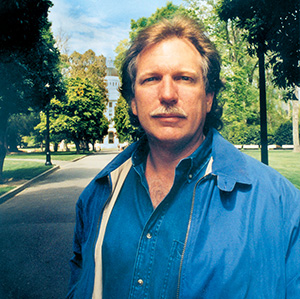

Webb Goes
Worldwide
There’s a scene in Kill the Messenger that will make every investigative journalist in America break into an insider’s grin. It’s the one where—after a year of tough investigative slogging that had taken him from the halls of power in Washington, D.C., to a moldering jail in Central America to the mean streets of South Central Los Angeles—Renner as Webb begins to actually write the big story. In an absorbing film montage, Renner is at the keyboard as it all comes together—the facts, the settings, the sources. The truth. The Clash provides the soundtrack, with Joe Strummer howling: Know your rights / these are your rights You have the right to free speech / as long as you’re not dumb enough to actually try it.
It took the real Gary Webb a long time to get to this point in his career.
His father, a U.S. Marine, moved Webb around a lot in his youth, from California to Indiana to Kentucky to Ohio. He wound up marrying his high-school sweetheart, Sue Bell, with whom he had three children. Inspired by the reporting that uncovered Watergate and in need of income, he left college three units shy of a degree and went to work at The Kentucky Post, then The Plain Dealer in Cleveland, where he rose quickly through the ranks of grunt reporters. Dogged in his pursuit of stories, Webb landed a job at the Mercury News in 1988 and became part of a team that won a Pulitzer Prize in 1989 for reporting on the Loma Prieta earthquake.
It was the summer of 1996 when the lone-wolf journalist handed his editors a draft of what would become the three-part, 20,000-word expose “Dark Alliance.” The series was exhaustive and complex. But its nugget put human faces on how CIA operatives had been aware that the Contras (who had been recruited and trained by the CIA to topple the leftist Sandinista government in Nicaragua) had smuggled cocaine into the United States and, through drug dealers, fueled an inner-city crack-cocaine epidemic.
When “Dark Alliance” was published on August 18 of that year, it was as if a bomb had exploded at the Mercury News. That’s because it was one of the first stories to go globally viral online on the paper’s then state-of-the-art website. It was 1996; the series attracted an unprecedented 1.3 million hits per day. Webb and his editors were flooded with letters and emails. Requests for appearances piled in from national TV news shows.
“Gary’s story was the first Internet-age big journalism expose,” said Nich Schou, who wrote the book Kill the Messenger, on which the movie is partially based, along with Webb’s own book version of the series, Dark Alliance. “If the series had happened a year earlier it, ‘Dark Alliance’ just would have come and gone,” said Schou.
As word of the story spread, black communities across America—especially in South Central—grew outraged and demanded answers. At the time, crack cocaine was swallowing up neighborhoods whole, fueling an epidemic of addiction and crime. Rocked by the revelations, U.S. Rep. Maxine Waters, congresswoman for Los Angeles’ urban core to this day, used her bully pulpit to call for official investigations.
But after a six-week honeymoon period for Webb and his editors, the winds shifted. The attacks began.
On Oct. 4, The Washington Post stunned the Mercury News by publishing five articles assaulting the veracity of Webb’s story, leading the package from page one. A few weeks later, The New York Times joined with similar intent.
The ultimate injury came when the L.A. Times unleashed a veritable army of 17 journalists (known internally as the “Get Gary Webb Team”) on the case, writing a three-part series demolishing “Dark Alliance.” The L.A. paper—which appeared to onlookers to have missed a giant story in its own backyard—was exhaustive in its deconstruction, claiming the series “was vague” and overreached. “Oliver Stone, check your voice mail,” summed Post media columnist Howard Kurtz.
Now, even some of Webb’s supporters admitted that his series could have benefited from more judicious editing. But why were the “big three” so intent on tearing down Webb’s work rather than attempting to further the story, as competing papers had done back in the day when Bob Woodward and Carl Bernstein broke the Watergate scandal?
Some say it was the long arm of former President Ronald Reagan and his team’s ability to manipulate the gatekeepers of old media to its purposes. (Reagan had, after all, publicly compared the Contras to “our Founding Fathers” and supported the CIA-led attempt to topple the Sandinista government.)
Others say that editors at the “big three” were simply affronted to have a midsize paper like the Mercury News beat them on such a big story. An article in the Columbia Journalism Review claimed some L.A. Times reporters bragged in the office about denying Webb a Pulitzer.
One of their big criticisms was that the story didn’t include a comment from the CIA. When reporters at the big three asked the agency if Webb’s story was true, they were told no. The denial was printed in the mainstream media as if it were golden truth.
Other issues fueled controversy around Webb’s story. For example: It was falsely reported in some media outlets—and proclaimed by many activists in the black community—that Webb had proven the CIA was directly involved in drug trafficking that targeted blacks. He simply did not make this claim.
In some ways, Webb became the first reporter ever to benefit from, and then become the victim of, a story that went viral online.
After triumphing in the early success of the series, Webb’s editors at the Mercury News became unnerved and eventually backed down under the pressure. Jerry Ceppos, the paper’s executive editor, published an unprecedented column on May 11, 1997, that was widely considered an apology for the series, saying it “fell short” in editing and execution.
When contacted by SN&R, Ceppos, now dean of the Manship School of Mass Communication at Louisiana State University, said he was only barely aware of the film coming out and wasn’t familiar with the acting career of Oliver Platt, who plays him in the movie. “I’m the wrong person to ask about popular culture,” he said.
Asked if he would do anything differently today regarding Gary Webb’s series, Ceppos, whose apologia did partially defend the series, responded with an unambiguous “no.”
“It seems to me, 18 years later, that everything still holds up. Everything is not black and white. If you portrayed it that way, then you need to set the record straight.
“I’m very proud that we were willing to do that.”
Some find irony in the fact that Ceppos, in the wake of the controversy, was given the 1997 Ethics in Journalism Award by the Society of Professional Journalists.
Webb, once heralded as a groundbreaking investigative reporter, was soon banished to the paper’s Cupertino bureau, a spot he considered “the newspaper’s version of Siberia.” In 1997, after additional run-ins with his editors, including their refusal to run his follow-up reporting on the “Dark Alliance” series, he quit the paper altogether.
But a year later, he was redeemed when the CIA’s inspector general, Frederick Hitz, released his 1998 report admitting that the CIA had known all along that the Contras had been trafficking cocaine. Reporter Robert Parry, who covered the Iran-Contra scandal for the Associated Press, called the report “an extraordinary admission of institutional guilt by the CIA.” But the revelation fell on deaf ears. It went basically unnoticed by the newspapers that had attacked Webb’s series. A later internal investigation by the Justice Department echoed the CIA report.
But no apology was forthcoming to Webb, despite the fact that the central finding of his series had been proven correct after all…



